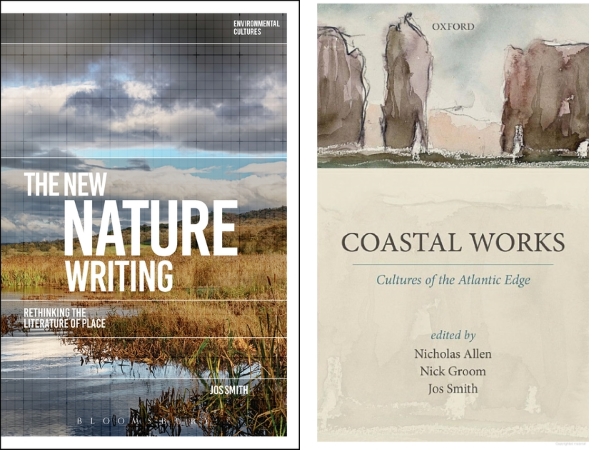Feeling for the Future
What might the nature writing of the future sound like? How will it register changed and changing relationships between humans, land, climate, and animal life?
Drawing together literary criticism, creative writing and environmental science, this project seeks to engage readers with tangible, possible futures as a way of provoking discussion and debate.
Challenge
If we are to meet the challenges of this critical decade for climate change, we need to begin to face some of the realities of transformational adaptation. But the complexity of future scenarios and the sheer scale of the data can produce paralysing feelings of inadequacy and incomprehension.
Preparing for painful and disorientating change and breaking with present structures of behaviour will be both a feat of radical imagination and ambitious implementation for everyone, individually and collectively. This project works with that radical imagination to produce engaging entry points to future worlds.
Insight
Nature writing is a literary form that has always registered something of our changing relationship with the natural world, drawing together scientific understanding with personal experience. Some have found it to be an overly conservative and retrospective form, but there is a little-understood history of nature writing that seeks to experiment and innovate in ways that bring contemporary change into view for its readers. The project suggests such experimentation and innovation might offer a through line to future visions in a way that builds on the form’s intimate and embodied narratives grounded in place.
Using – and at times subverting – the historic forms and conventions of nature writing in a speculative mode can help to connect past, present and future, giving rise to powerful feelings about change.
In addition to its book-length creative work, the project is commissioning a range of international authors to explore experimental forms and possible futures, running creative writing workshops across the country, and working with BirdLife International to explore ways of creatively capturing some of the ‘cultures of nature’ in scientifically important areas on the frontline of climate change.

Collaboration
The project sees a residency for PI Dr Jos Smith with BirdLife International at the Cambridge Conservation Initiative. BirdLife International hosts the Key Biodiversity Areas (KBA) Secretariat, tasked with identifying, monitoring and conserving a network of these crucial sites worldwide. As yet, there is little research on the cultural heritage of KBAs, meaning the writing about them and the data being gathered are predominantly western in nomenclature and often coldly managerial in terminology. The residency will support a period of collaborative research that will explore experimental practices of nature writing and its celebration of ‘cultures of nature’ to advocate for change in the language of these KBAs.
‘The choices we make today are producing the futures that we will come to inhabit. We need stories that help us to see those futures so that we can truly feel the power of those choices.’
- Jos Smith
Dr Jos Smith
Jos Smith is an associate professor of contemporary literature at UEA with an interest in the relationship between literature and the environmental movement. He has written on literature and environmental politics, literary and cultural geographies, especially coastal geographies, the New Nature Writing, and he is completing a cultural history of the arts and environmental charity Common Ground. He has also published poetry, place-based creative non-fiction and was the founding editor of The Clearing, an online journal for contemporary nature writing.
Examples of Jos Smith’s work:
- The New Nature Writing: Rethinking the Literature of Place (2017) London: Bloomsbury
Single authored monograph exploring the cultural significance of the UK publishing phenomenon the New Nature Writing in a contemporary context of climate change and Anthropocene studies. - ‘Vibrant localism: the Lure of Common Ground’. Critical Quarterly. 60:2 (July 2018): pp.86-102.
This paper explores the history of the arts and environmental charity Common Ground, especially their decision in the late 1970s to break away from Friends of the Earth (their directors were among the founding members in the UK) and set out to deliberately collaborate with the arts. They did this as a way of engaging the public with conservation and environmentalism in new ways that have been hugely influential on both the arts and grassroots conservation and heritage. - Coastal Works: Cultures of the Atlantic Edge (2017) Oxford: OUP
Co-edited volume of essays exploring the literature and cultural geography of the western coasts of the UK through the lens of the blue humanities and in the political context of British devolution. - Devine-Wright, P., Smith, J. & Batel, S., (2019), ‘“Positive parochialism”, local belonging and ecological concerns: Revisiting Common Ground's Parish Maps project’. Transactions of the Institute of British Geographers (44: 2): pp.407-421.
This is a paper that challenges some sceptical accounts of local belonging and ‘parochial thinking’ by looking at the kinds of activity prompted by a grassroots heritage initiative developed by the arts and environmental charity ‘Common Ground’. The paper delves into the Common Ground archives and draws a number of oral history interviews to build an argument for an open and progressive form of ‘positive parochialism’. It closes by drawing attention to the unresolved challenge of finding ways to realise the value of affect and creative environmental engagement in wider policy and land-use planning.
Discover More
)
Explore
more...How might nature writing adapt to reflect, communicate and respond to the huge environmental changes currently unfolding?

)